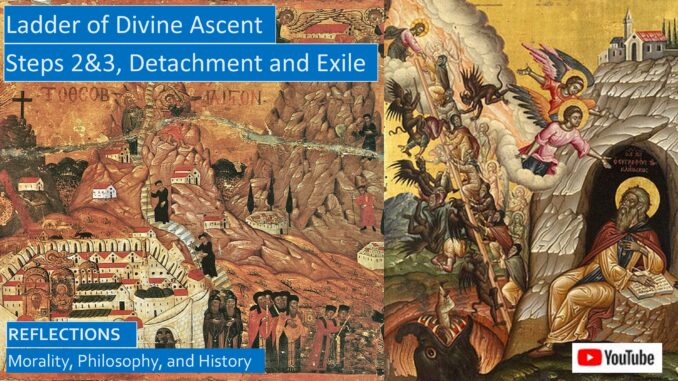
St John Climacus wrote the Ladder of Divine Ascent as a handbook for monks living the monastic life, cut off from the world, in the isolation of the Egyptian desert monasteries, in a world before global communications where the monk could easily call his family on the monastery phone. In the first chapter he has some advice for the layman who wishes to live the perfect life as best he can in the world, but the advice for his fellow monks must be allegorized to apply it to our lives as laymen living in the world.
YouTube introduction and Step 1: https://youtu.be/Fco0W3bt5GA
Script for this video, with more Amazon book links: https://seekingvirtueandwisdom.com/st-john-climacus-ladder-of-divine-ascent-on-detachment-exile-and-pilgrimage-steps-2-and-3/
YouTube video for this blog: https://youtu.be/qDtrgYmaAQU
STEP 2 ON DETACHMENT
Father John Mack is a priest who has written a book reflecting on the Ladder of Divine Ascent, summarizes the teachings of St John Climacus On Detachment:
“We must detach ourselves:
- From worldly concerns.
- From selfishness.
- From the vanity that follows obedience.”
Father John Mack warns us against undue attachment to the values of the world:
- “If we find ourselves becoming angry because others have taken or misused our things, then there is improper attachment.
- If we find ourselves becoming jealous or envious of others because of the things they possess, then there is improper attachment.
- In short, whenever we want or do anything just to bring pleasure to ourselves, there is improper attachment.”
If we read this spiritual classic carefully, we will observe that St John Climacus desires that we be forever giving and forgiving, never expecting any gain from those around us.
YouTube link: https://youtu.be/qDtrgYmaAQU
St John Climacus begins his teaching:
Step 2.1 “The man who really Loves the Lord, who has made a real effort to find the future Kingdom, who is really pained by his sins, who is really mindful of eternal torment and judgment, who really lives in fear of his own departure, will not love, care or worry about money, or possessions, or parents, or worldly glory, or friends, or brothers, or anything at all on earth.”
Nothing should come first before our Lord and our God, not things, not friends, not family, not father and mother. St John Climacus advises his brother monks to turn their backs on all of this when they enter the monastic life.
This admonition is very similar to the exhortation by Jesus in Matthew:
“He who loves father or mother more than Me is not worthy or Me. And he who loves son or daughter more than Me is not worthy of Me. And he who does not take his cross and follow after Me is not worthy of Me. He who finds his life will lose it, and he who loses his life for My sake will find it.”[1]
What is interesting is that husbands and wives are not on the list. Does this mean that Jesus never really wants to ask whether a husband and wife love each other more than Him? I do not recall anywhere in Scriptures where you are warned explicitly not to love your spouse more than God, although there are many, many verses saying that marriage is holy, that you should not forsake your marriage and marry another. Even Adam is not chastised for preferring his wife Eve’s company.
Marriage itself can be seen as a type of exile from your mother and father, when you start a new family. Just as St John Climacus warns the monks isolated in their desert monasteries not to look back on their life in the world, so Father Vassilios, another priest who has written a commentary on the Ladder of Divine Ascent, comments that he has heard many young married and women complain that they married too young, that they feel they sacrificed experiences in their youth for sake of their marriage and family. He warns them that they should not be tempted to look back.
This reminds us of story in the Book of Genesis where the angel saves Lot and his family from the destruction of Sodom, their only instruction is that they should not look back at the life of sin that they are leaving. But Lot’s wife does look back, and she is turned into a pillar of salt.
In Step 2.4, St John Climacus quotes the story of the Rich Young Man, but to truly understand this story, we must read immediately preceding verses. In those verses, after Jesus blesses the little children, ““Let the children come to me, do not hinder them; for to such belong the kingdom of God.”
This leads into the story of the rich young man, who asks what he needs to do to inherit eternal life. Jesus exhorts him, “You know the commandments: ‘Do not kill, Do not commit adultery, Do not steal, Do not bear false witness, Do not defraud, Honor your father and mother.’” And he said to him, “Teacher, all these I have observed from my youth.” And Jesus looking upon him loved him, and said to him, “You lack one thing; go, sell what you have, and give to the poor, and you will have treasure in heaven; and come, follow me.”[2] St John Climacus adds to the story, that the rich young man was bade to “become a beggar who receives alms from others,” which completes his total detachment from the world.
Father Mack teaches us that “in addition to this detachment from selfish possessiveness, we must also be very careful not to become addicted to the praise of men. St John Climacus describes it in this way:
Step 2.6. ‘I have seen many different plants of the virtues planted by them in the world, watered by vanity as if from an underground cesspool, made to shoot up by love of show, manured by praise.’
This is the sin of the Pharisees: To love the praise of men; to become attached to the opinions of others.”
Father John Mack retells the story of St Makarios, who was asked by a pilgrim on how he can find salvation. Our saint instructed the pilgrim to go to the cemetery and insult those who departed, and after that to return to the cemetery, this time praising those who departed. Our saint asked him how the dead responded, and there was only silence. St Makarios bid him, “Go and do the same, and you will be saved. Be dead to both to the praises and curses of men and you will be saved.”
The key passage in this chapter speaks of how we should seek detachment by the narrow way through the fasting of the body, but more importantly, through the fasting of the soul. The short list is how we should fast our body:
Step 2.8. “Let us pay close attention to ourselves so that we are not deceived into thinking that we are following the straight and narrow way, when in fact we are keeping to the wide and broad way. The following will show you what the narrow way means: mortifications of the stomach, all-night standing, water in moderation, short rations of bread.” In the Orthodox tradition, fasting does not mean starving yourself, but rather to eat moderately and watching what you eat.
This is followed by a list of how we can fast the soul:
Step 2.8. (continued) We follow the narrow way through “the purifying draught of dishonor, sneers, derision, and insults.”
How do we react when our loved ones treat us so? How many of us can regard their sneers, their derision, their insults, as if it were a wine from heaven?
“By the cutting out of one’s own will, patience in annoyances, unmurmuring endurance of scorn, disregard of insults.”
If we insist on being detached from the things of the world, not everyone will want to be our friends. Do we object when we hear someone cursing God? Do we collude with those who gossip saying unkind things about others? Do we laugh at lewd jokes or stay silent when evil men brag about their Friday night plans? Are we kind when others are cruel? Do we disdain beggars?
If we are truly to love our neighbor as ourselves, we are not important. How can we begin to return the Love of God? To love our neighbor as ourselves is to be as patient with them as God is with us. Thus, patience in annoyances is near the top of this list. How can we know that scorn and insults that are thrown at us by our neighbor were directed towards us? How can we know whether they were a reaction to cruel and heartless actions suffered by our neighbor deep in their past? How can we bring out the best in our neighbor if we return nastiness with nastiness?
Continuing with Step 2.8. We must adopt “the habit,
When wronged, of bearing it sturdily.
When slandered, of not being indignant.
When humiliated, not to be angry.
When condemned, to be humble.
Blessed are they who follow this way, for theirs is the Kingdom of Heaven.”
It is easy to hear a sermon of how we should forgive seven times seventy times, as Jesus exhorts us, until we actually try to forgive our loved ones who wrong us repeatedly. True detachment means that we would Love God with all of our heart and with all of our soul and with all of our mind and with all of our strength, now and forever, unto ages of ages, so that at no moment will our thoughts of the temporal pleasures of this world crowd out our Love for God, eternal and never-ending.[3]
ON EXILE AND PILGRIMAGE
Exile and pilgrimage are the third rung of the Ladder of Divine Ascent. The word for exile in Koine Greek can be translated either as exile or pilgrimage. Although we cannot truly live a life of physical exile as did the monks in the ancient desert monasteries of Egypt, totally isolated from the world, we must live a life of spiritual exile from the enticements of the world.
For St John Climacus, this is exile from the familiar, from family and friends and things, and pilgrimage to monastic life in the desert, a pilgrimage to a life lived not alone but filled with the Love of God, worshipping God with the brothers of the monastery. For us laymen living in the world, it is exile from a life of selfish sinfulness, a pilgrimage to a life of servitude, to our wives and husbands, children, co-workers, and all those whom we meet day to day.
Likewise, if we act like exiles and pilgrims, not everyone will want to be our friends. Do we object when we hear someone cursing God? Do we collude with those who gossip saying unkind things about others? Do we laugh at lewd jokes or stay silent when evil men brag about their Friday night plans? Are we kind when others are cruel? Do we disdain beggars?
Do we follow the advice of St John Climacus?
Step 3.9. “Run from places of sin as from the plague. For when fruit is not present, we have no frequent desire to eat it.”
Those who feel they can dance and drink and troll on Saturday night and with good conscience attend Divine Liturgy on Sunday morning should consider the next bit of advice:
Step 3.10. “Be on the look-out for this trick and wile of the thieves. For they suggest to us that we need not separate ourselves from people in the world and maintain that we shall receive a great reward if we can look upon women and still remain continent.” I am quite sure if St John Climacus were alive today, he would also advise us to be careful what movies and television shows we watch, and what books we read.
One spiritual struggle we all face is the challenge, Who is going to influence whom? Will we influence the world and our friends with our virtue and righteousness? Or will the world and our culture influence us? As St John Climacus teaches us,
Step 3.15. “Let him be your father who is able and willing to labor with you in bearing the burden of your sins; and your mother, contrition, which can cleanse you from impurity; and your brother, your comrade who toils and fights side by side with you in your striving toward the heights.”
The Lord’s Prayer prays, lead us not into temptation, but deliver us from evil. But, is it only God’s responsibility that we not be led into temptation? Indeed, not only should we exile ourselves from places of temptation, but we should also make a pilgrimage to places where there are few temptations.
Step 3.18. “For our solitary life let us choose places where there are fewer opportunities for comfort and ambition, but more for humility. Otherwise, we shall be fleeing in company with our passions.”
Step 3.19. St John Climacus bids us to be humble, “hide your noble birth and do not glory in your distinction.”
St John Climacus warns us not to be like those in the famous icon who the demons succeed in pulling down from the Ladder of Divine Ascent, and if you look closely, the demons even succeed in pulling down clerics:
Step 3.22. “By much labor and effort, a good and stable character is developed in us. But what is achieved with great labor can be lost in a single moment, for ‘evil conversation corrupts good habits.’”
Father Vassilios teaches us that living a life of spiritual exile from the world, while in the world, requires balance. On one hand, when we live as an exile, as St John Climacus urges us to “remain unheralded, unpublicized, masked, unseen; it is the striving to be humble, a wish for poverty, a denial of vainglory.”
On the other hand, “St John Climacus warns us that exile requires discretion, since not every kind of exile is good if take to extremes. I have heard Christians insist on concealing their gifts and talents for the sake of their humility.” We must not be like the servant who buries his talents in the earth. (Matthew 25:14-30)
The parting advice of St John Climacus for the third rung of the ladder is to never give up, persist, grab hold of the next rung of the ladder, climbing every upwards:
Step 3.29. “This is the third step, which is equal in number to the Trinity. He who has reached it, let him not look to the right nor to the left.”[4]
The Stoic philosopher Musonius Rufus also speaks of exile, which was a common punishment in ancient Greece and the ancient world. In Athens, each year the Assembly of all voting males could vote to ostracize a leading citizen, sending him into exile from the city for a number of years, usually to a neighboring city-state. Often, we may suffer exile of sorts, when we are fired or laid off from a job, or when we suffer the loneliness of divorce. Rufus asks us, “How can exile be an obstacle to the acquisition of virtue, when no one was ever hindered from the knowledge and practice of what is needful because of exile?”
Ahead we climb the fourth rung on Obedience, which we will release in early 2023, then the fifth rung, the persistence of repentance, which we compare to the unrelenting campaign against Hitler, where the Allies demanded unconditional surrender from the forces of evil. There will be two videos before the rungs of the ladder where we will confront the sins and spiritual dangers of slander, talkativeness, and lying.
https://youtu.be/NiuWNsy4x4Q and https://youtu.be/SLBIdDHRy3A
DISCUSSING THE SOURCES
Both of these editions of the Ladder of Divine Ascent use the same translation, but each has its own thoughtful introductions, the introduction in the Classics of Western Spirituality is by Bishop Kallistos Ware. We find this work as easy to read as the works of the Stoic Philosophers that influenced Christianity and the monastic tradition, but we also have the commentaries by Father John Mack and Father Vassilios Papavassiliou, which are valuable because they reflect their experience as priests hearing confessions.
[1] https://www.biblegateway.com/passage/?search=matthew+10%3A37-39&version=RSVCE
[2] https://www.biblegateway.com/passage/?search=mark+10%3A13-22&version=RSVCE
[3] St John Climacus, Ladder of Divine Ascent (Boston: Holy Transfiguration Monastery, 1991, originally written 1100’s, translated by Colm Luibheid and Norman Russell), Step 2, pp. 11-14; and Father John Mack, Ascending the Heights, Laymen’s Guide to the Ladder of Divine Ascent (Ben Lamond, California: Conciliar Press, 1999), Step 2, pp. 18-19; and Father Vassilios Papavassiliou, Thirty Steps to Heaven, The Ladder of Divine Ascent for All Walks of Life (Chesterton, Indiana: Ancient Faith Publishing, 2103), Step 2, p. 27.
[4] St John Climacus, Ladder of Divine Ascent, Step 3, pp. 14-19; and Father Vassilios Papavassiliou, Thirty Steps to Heaven, pp 31-32.

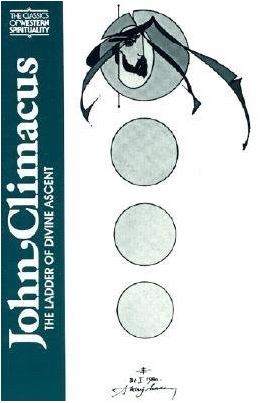
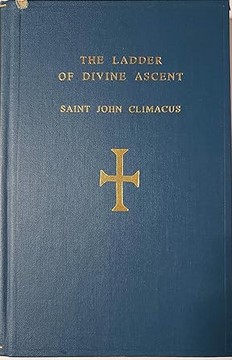
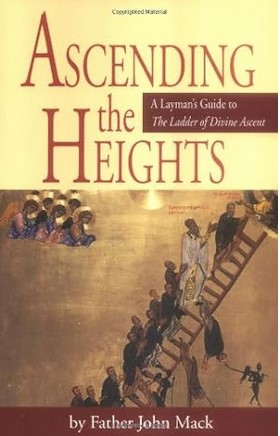
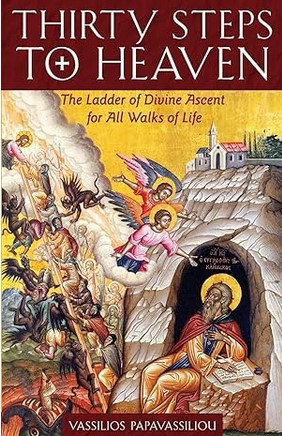
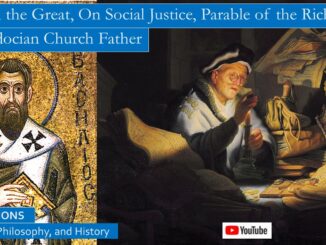
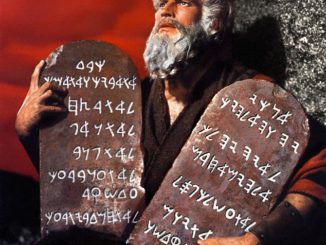
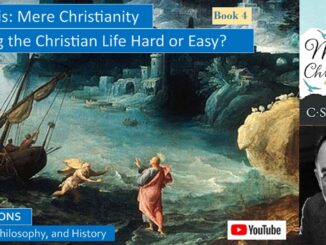
1 Trackback / Pingback